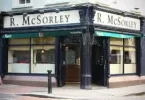Night-Time Economy representatives attend workshop

Opportunities as well as challenges to creating new and diverse activity in the Night-Time Economy were identified and addressed collaboratively in the workshop.
Representatives from organisations relating to the sector participated in the event, seeking to identify how artistic, creative and community spaces can be supported by the planning and development process.
Invitees to the workshop included those working in the NTE Sector, Give Us The Night, An Garda Síochána, local authorities, members of the NTE Taskforce (including Fáilte Ireland), the Arts Council, representatives from the retail sector, the Vintners Federation of Ireland, the Licensed Vintners Association, Government Departments and agencies as well as other representative groups.
The Workshop took place in direct response to Action 16 in the Report of the Night-Time Economy Taskforce.
Challenges around planning, regulation and access to space had been raised consistently by those working in the industry throughout the consultation process for the development of the NTE Taskforce Report.
Action 16 of this Report committed to the holding of a dedicated workshop to understand and determine the range and practical scope of planning and development-related actions that can support the NTE. The aim is to develop Best Practice guidance to assist local authorities and others to plan effectively for the NTE in a multi-use urban context.
Opportunities as well as challenges to creating new and diverse activity in the NTE were identified and addressed collaboratively in the workshop and a number of key themes were addressed including:
- Town centre revitalisation, including outdoor spaces
- Meanwhile use of vacant spaces
- Cultural Infrastructure provision
- Defining and identifying cultural spaces
- Noise management, including agent of change principle
- Planning and licensing.
The workshop included presentations from Jo Cox Browne, founding Director of Night Time Economy Solutions, who’s passionate about helping towns and cities become safer, vibrant and more attractive at night.
Jo has experience of working in partnership with police forces, police and crime commissioners, Business Improvement Districts, local authorities, hospitals, universities, licensed premises and voluntary organisations to help them design innovative solutions that can reduce crime and vulnerability.
Julie McLaughlin, Co-Founder of Jando Design and an artist based in The Chocolate Factory (as well as being manager of the venue) spoke at the event, outlining the story of overcoming the various challenges to opening this innovative and creative venue.
“We’ve heard loud and clear throughout the development of the Night-Time Economy Taskforce Report that we need more artistic, creative and community spaces which can operate and support the Night-Time Economy and we all want to see our planning and development system supporting this need,” said Minister Catherine Martin, “Cultural spaces are really important for our communities and individuals and this importance shouldn’t be underestimated. It can bring communities together, make people feel more engaged and part of something bigger than themselves.
“Helping to develop a more vibrant Night-Time Economy is not the job of any one Department or Minister – it involves all of us working together and trying to make things happen”.
Minister of State Malcom Noonan added, “The Night-Time Economy is a key economic sector of our cities and towns and also one of the things that makes them great places to live in and visit. Supporting this through a Town Centre First approach that maximises the use of vacant buildings and encourages the development of quality public spaces is part of our agenda to invest in regeneration and amenities that benefit local communities in the widest sense. In doing this, it’s important too that a vibrant Night Time Economy doesn’t impact negatively on town centre living.
“Issues such as safety and noise can be addressed through collaborative actions led by local government. We need to ensure that the necessary procedures and systems that regulate the Night-Time Economy are fit for purpose and can respond to the needs of those working in the area.
“Through this workshop we can learn from the many voices interested in seeing a lively and successful Night-Time Economy maintained – hearing the different experiences and suggestions on how changes can be made.”
The feedback from this workshop is to be collated into a report which will be submitted to the Department of Housing, Local Government and Heritage and the Department of Tourism, Culture, Arts, Gaeltacht, Sport and Media. It will also be considered by the Taskforce Implementation Group for further action where necessary.








